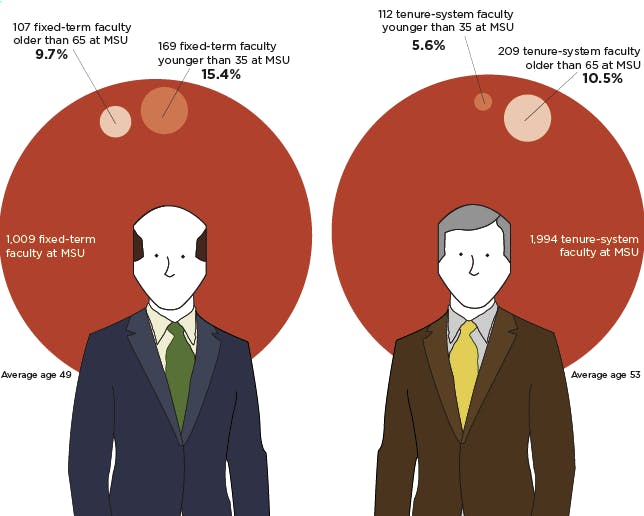“I have found that you can relate more on … a social level to younger professors,” she said. “(But) I’ve had older professors who are the most interesting people I have had.”
In some cases, the older professors Robinson referred to are part of the university’s tenure system, a multi-step appointment process that promotes faculty, giving them better contracts and benefits based on the quality of their teaching and research.
Tenure helps protect faculty from layoffs and budget reductions as well.
But there are some teachers and researchers at MSU who don’t have tenure and only work for a specific period of time.
Of 4,927 faculty and staff at MSU in fall 2010, 1,045 were fixed-term faculty members. By comparison, in fall 2008, MSU employed 1,092 fixed-term faculty members out of 5,052 total faculty members, according to the Office of Planning and Budgets’ Planning Profile Summary on its website.
The differences extend beyond years of service to professional responsibilities. Some tenured faculty operate large research programs, teach classes and advise undergraduate and graduate students, but the responsibilities of fixed-term faculty differ based on their contracts.
Balancing the budget
In recent years and in the wake of a reduced budget, university officials have had to re-examine their faculty, looking into who they retain and who they let go. Fixed-term faculty are the first out the door more often than not, said Dave DeWitt, associate dean of the College of Natural Science.
“When we do these budget reductions, you don’t fire tenured faculty,” he said. “When you make decisions about this, you only have so many degrees of freedom.”
Fixed-term faculty, on average, are slightly younger than their tenured counterparts. The average age of a tenured faculty member is 53; with fixed-term faculty members it’s 49, according to the Office of Planning and Budgets’ Planning Profile Summary for fall 2010.
Because of the more specific nature of their work, which typically focuses on one area of study, turnover can be high among fixed-term faculty, particularly in recent years.
The faculty cuts stem from a budget crisis which hit Michigan’s state universities — including MSU — particularly hard in the past several years, said Theodore Curry, MSU’s associate provost and associate vice president for academic human resources.
From a student’s perspective, as younger, fixed-term faculty leave MSU and older professors continue teaching, differences emerge, Robinson said.
“Older professors can be more strict … in their grading,” she said. “Younger professors … are more liberal.”
The tenure track
In 13 of 17 colleges at MSU, tenure faculty members are older on average than fixed-term faculty within the college.
In some areas of the university, the difference in faculty age is more pronounced than others. In the College of Nursing, for example, the average age of a tenured faculty member is 59, and fixed-term faculty members are, on average, age 49.
With the average age of retirement currently at 65-66 years old, Donna Zischke, MSU’s director of academic human resources, said the university has noticed some faculty members are working beyond what is considered the “normal age” of retirement.
Despite the trend, age does not seem to prevent faculty members from doing their jobs effectively, Curry said.
“Every faculty member’s performance is reviewed every year, and so to the extent that the faculty age is going up, it says nothing in my mind about productivity,” he said. “The assumption is that faculty are continuing to perform.”
Support student media!
Please consider donating to The State News and help fund the future of journalism.
No-preference freshman Georgeanne Schievink said she enjoys learning material in classes taught by more experienced faculty.
“I have a writing class with an older professor … She’s very interesting; and I like her,” she said.
The process of obtaining tenure is a potentially lengthy one and can differ if outside faculty initially are brought in as either an associate professor or as a lower-ranking assistant professor, said Christopher Maxwell, the associate dean for research and graduate studies in the College of Social Science.
The probationary period for an associate professor with the university differs, but it can last up to four years before the faculty member’s performance is reviewed. If the professor is re-appointed, they are given tenure status, according to MSU’s faculty handbook.
A temporary assignment
Unlike tenured faculty who take on multiple responsibilities, fixed-term university employees focus their work mainly in one specific area, such as teaching or research.
Although they are not considered part of the tenure track system, fixed-term faculty members hold the title of either assistant professor, associate professor or professor, despite having a different contract and job requirements.
Generally, fixed-term faculty members tend to be involved in large-scale projects, international programs or externally funded projects, said Frank Fear, senior associate dean for MSU’s College of Agriculture and Natural Resources.
“Many of these fixed-term faculty are appointed for that exclusive purpose,” Fear said. “They play such a critical role in the work we do.”
Some fixed-term faculty now are stepping up their responsibilities in different ways than before.
“A lot of things fixed-term faculty are doing now was done entirely by tenure stream faculty in the past,” DeWitt said.
To help accommodate larger class sizes, the College of Natural Science, where DeWitt works, requires fixed-term faculty members to take on larger roles in teaching and instruction than in years past.
“I think we’ve seen a great integration of fixed-term faculty into instruction,” DeWitt said.
Some faculty are brought in to help with instruction and teaching assignments on a semester-to-semester basis, before moving on to other assignments.
Kara Gregory, a fixed-term assistant professor in the Department of Human Development and Family Studies, said moving back and forth between teaching and professional work constantly refreshes her knowledge of her field, ultimately benefiting students.
“I’m very current,” said Gregory, who has been working off and on at MSU since 2000. “It keeps me from becoming obsolete.”
Although the idea of a lack of job security might cause some professionals to shy away from fixed-term positions, some use it as an opportunity to focus on other aspects of life, such as family.
Maintaining productivity
Curry said before the budget cuts of past years, the university was going through efforts to ramp up the number of tenure-system faculty.
But with MSU losing millions of dollars in state aid, that process had to end sometime, he said, and MSU President Lou Anna K. Simon and other administrators directed colleges and departments to re-examine their focus.
“Until the budget crunch of the last couple of years, we were making steady progress,” he said.
Curry said the university wants to eventually promote more faculty to tenure, when the time is appropriate.
Fear said at other universities across the country, the commitment to retaining experienced, tenure-system faculty is diminishing.
But, Zischke said the university as a whole doesn’t plan to replace retiring tenured faculty members with additional fixed-term positions.
“There’s no intent at the university level to reduce the amount of tenured system faculty,” she said.
Associate professor of economics Chris Ahlin said as members of a large research university, faculty members need to hone their skills in other areas before stepping up in front of a classroom.
“If MSU wants to continue to stress research productivity, they should continue to go in the route of tenured track faculty,” Ahlin said. “It’s hard to teach well without a good background in research.”
Discussion
Share and discuss “Keeping track of tenure” on social media.







